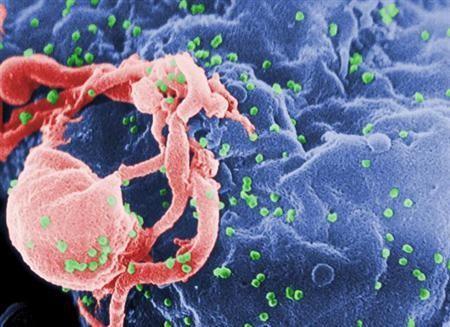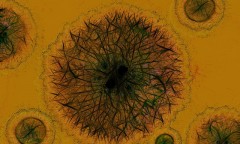By Lynn Palec, | March 11, 2016

An electron micrograph of the HIV virus in an image courtesy of the CDC.
Despite the rise and advancement of technology, scientists are still working hard to find a cure to one of the most rampant viruses in the world, the human immunodeficiency virus or HIV. While this might be true in the past couple of years, scientists are making headways recently as they were able to uncover the ancient history of the viruses which could lead them to finally finding a cure to this horrifying virus.
Like Us on Facebook
While the latest discovery does not necessarily mean scientists can create a cure out of it, experts believe that the finding will help researchers get a better understanding of how the virus evolves and through this, they might finally create an antidote to counter it.
Normally, when a person becomes infected with HIV, their immune system creates an antibody called B cells. These are tiny proteins that are alluded to as the soldiers of the human body since they are the ones that counters these foreign viruses.
However, HIV mutates so rapidly that these antibodies are rendered ineffective. By the time B cells detects and kills an HIV affected cell, a new viral mutant has already taken over.
A recent breakthrough scientific study published in the journal Cell, HIV researchers from Duke University claims that there were able to track the evolution of HIV antibodies and may have found the cure to the dreaded virus. The team led by Barton Haynes claims that in one of their tests, they were able to kill about 90 percent of all the different types of HIV they encountered.
In a statement acquired by The Atlantic, National Institutes of Health and one of the study's co-author Peter Kwong said, "Anytime an antibody can kill 90 percent of HIV, I think that's extraordinary."
Since 1987, at least 30 potent HIV vaccines have been tested in clinical trials. Most of these vaccines have failed to suppress the virus since HIV has an enormous variability making it difficult to counter.
Haynes and Kwong are planning to use their findings to develop a preventative HIV vaccine. Moreover, the team behind the research is also planning to create a series of vaccines that can be administered during childhood.
-
Use of Coronavirus Pandemic Drones Raises Privacy Concerns: Drones Spread Fear, Local Officials Say

-
Coronavirus Hampers The Delivery Of Lockheed Martin F-35 Stealth Fighters For 2020

-
Instagram Speeds Up Plans to Add Account Memorialization Feature Due to COVID-19 Deaths

-
NASA: Perseverance Plans to Bring 'Mars Rock' to Earth in 2031

-
600 Dead And 3,000 In The Hospital as Iranians Believed Drinking High-Concentrations of Alcohol Can Cure The Coronavirus

-
600 Dead And 3,000 In The Hospital as Iranians Believed Drinking High-Concentrations of Alcohol Can Cure The Coronavirus

-
COVID-19: Doctors, Nurses Use Virtual Reality to Learn New Skills in Treating Coronavirus Patients












